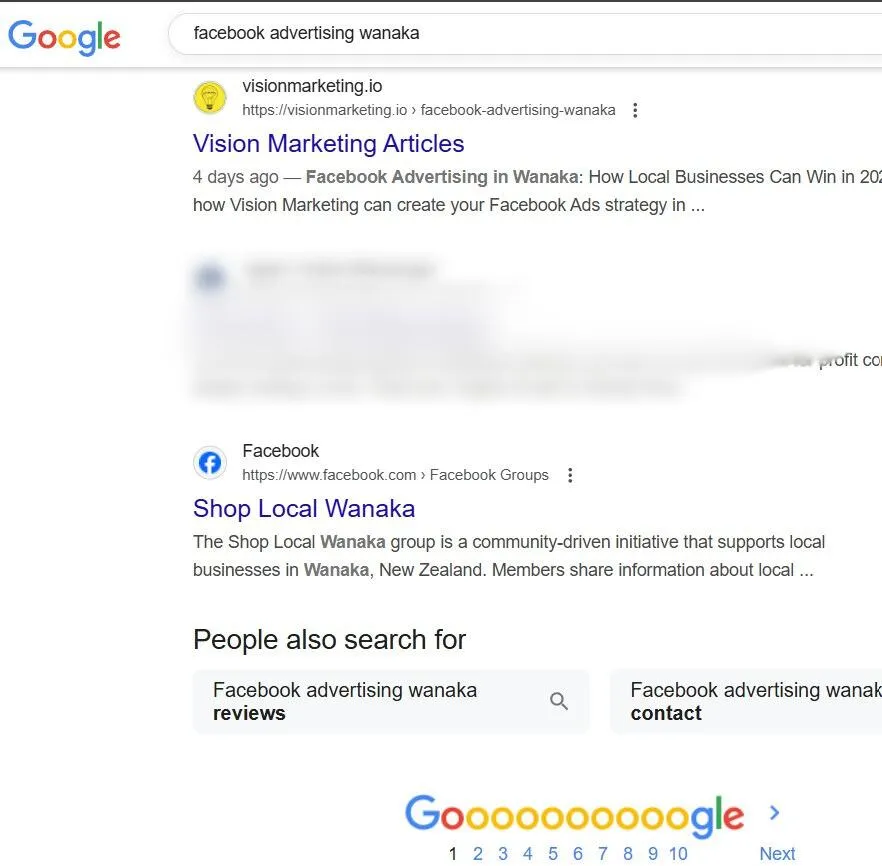How My Article Ranked on Page One of Google
And How Your Business Can Too
At Vision Marketing, we don’t just talk about digital marketing, we test, learn, and prove what works.
A great example is our recent article “Facebook Advertising in Wanaka: How Local Businesses Can Win in 2025”, which is now ranking on the first page of Google when people search “Facebook Advertising Wanaka.”
For a small business in New Zealand, breaking onto the first page of Google might feel impossible, but it’s not. With the right strategy, even businesses with smaller budgets and new websites can compete with bigger players.
Here’s exactly how we approached it, and how you can apply the same method to your own content.
Why That Article Ranked

Before publishing, we didn’t just write and hope for the best, we made a plan:
Keyword research first.
Using SEO tools, we searched for the best terms people in our region were actually typing into Google. We discovered that “Facebook Advertising Wanaka” had search volume and very low competition.
Title + keyword alignment.
We used the exact keyword in the title and wove it naturally through the article, making sure it was highly relevant to the searcher’s intent.
Audience-focused content.
The article wasn’t just for Google—it was for local business owners who wanted practical advice. Relevance keeps people reading, which signals quality to search engines.
Internal linking.
We linked the article back to our website, helping Google understand how it fits into the bigger picture of what Vision Marketing offers.
The result? A first-page ranking on Google. And the best part: it continues to attract clicks from local business owners who may one day become clients.
How Your Business Can Rank on Google Too
If you want your business to be discovered online, showing up when someone searches for your service is essential. Here are four tips to help you climb Google’s rankings:
1. Do Smart Keyword Research

Don’t guess what people search for, find out.
Tools like MOZ, Ubersuggest, or the free Google Keyword Planner reveal search volumes and keyword difficulty.
For example, our research showed that “Dentist Wanaka” has around 160 searches per month and very low competition. That’s a keyword many local businesses could realistically rank for.
2. Write for Humans First, Search Engines Second
Once you pick your keyword, use it naturally in your title, headings, and first paragraph.
But remember: your real goal is to solve your audience’s problem.
The more useful and relevant your article is, the longer people stay on the page; boosting your SEO.
3. Build Internal and External Links
Link to other helpful pages on your own site, but also aim for backlinks—when another reputable website links to your article.
Google sees backlinks as votes of confidence, making your content more trustworthy. Even a single local backlink (e.g., a community directory or partner website) can make a big difference.
4. Be Consistent With Content
One article can rank, but consistent publishing builds authority.
Think of each piece as a brick: together, they form the foundation of your digital presence. Over time, Google rewards websites that regularly share relevant, high-quality content.
FINAL word
Ranking on Google isn’t about luck, it’s about strategy.
Our article on Facebook advertising in Wanaka shows what’s possible when you carefully choose your keywords, create content that speaks to your audience, and optimize for search engines.
If you’re a small business owner in New Zealand, you don’t need to outspend the competition.
You just need a plan. Start with the right keyword research, commit to consistent content, and you’ll be surprised at how quickly your business can rise in the search results!
